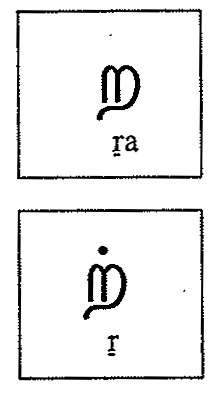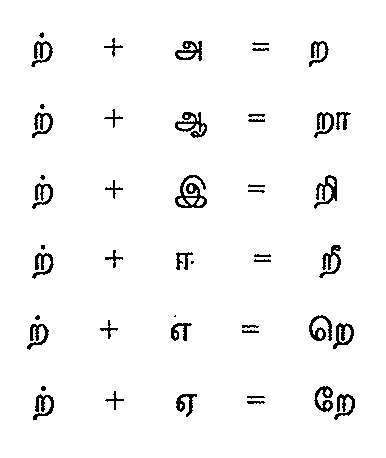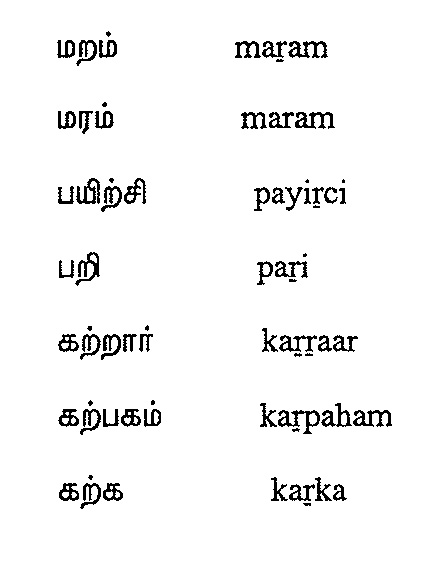Frame 10

![]() (r) This is produced by the rapid vibrations by the tip of the tongue against the middle of the alveolar ridge. The soft palate is raised to close the nasal passage. The vocal cords are vibrated. This may be described as a voiced alveolar trill. This will not occur in the word initial position. This occurs in the word medial position as a single consonant between two vowels as in the word,
(r) This is produced by the rapid vibrations by the tip of the tongue against the middle of the alveolar ridge. The soft palate is raised to close the nasal passage. The vocal cords are vibrated. This may be described as a voiced alveolar trill. This will not occur in the word initial position. This occurs in the word medial position as a single consonant between two vowels as in the word, ![]() and as the first member of a consonant cluster.
and as the first member of a consonant cluster.
It is to be recollected that we have seen ![]() before in Frame 3. It is very essential to know the difference between
before in Frame 3. It is very essential to know the difference between ![]() (r) and
(r) and ![]() (r) in the pronunciation and writing. The difference should be maintained, because in similar context these two sounds bring change in meaning. The
(r) in the pronunciation and writing. The difference should be maintained, because in similar context these two sounds bring change in meaning. The ![]() occurs in a word in all positions. It occurs medially as a single consonant between two vowels, as in
occurs in a word in all positions. It occurs medially as a single consonant between two vowels, as in ![]() , as the first member of a consonant cluster, as the second member of a consonant cluster and as the first member of a three consonant cluster.
, as the first member of a consonant cluster, as the second member of a consonant cluster and as the first member of a three consonant cluster.
Write three times the letter.

The vowels ![]() ,
, ![]() ,
, ![]() ,
, ![]() ,
, ![]() ,
, ![]() are added to this consonant. Note how they are written with their respective secondary symbols. For the vowel,
are added to this consonant. Note how they are written with their respective secondary symbols. For the vowel, ![]() the secondary symbol for
the secondary symbol for ![]() was different not the same as the one in use in the mordern Tamil (the old secondary symbol is no longer in use).
was different not the same as the one in use in the mordern Tamil (the old secondary symbol is no longer in use).

It is to be noted that ![]() (r) cannot occur in double but
(r) cannot occur in double but ![]() (r) can.
(r) can.
![]() the pure consonant, occurs with a consonant+vowel letters (
the pure consonant, occurs with a consonant+vowel letters (![]() ,
, ![]() ,
, ![]() ,
, ![]() ), as a clusters like
), as a clusters like ![]() ,
, ![]() ,
, ![]() ,
, ![]() … Of course, this trill simply occurs as
… Of course, this trill simply occurs as ![]() as seen in the words
as seen in the words ![]() ,
, ![]() ,
, ![]() etc.
etc.
The cluster, ![]() as found in the word
as found in the word ![]() and in similar position in the other words. While reading the first letter
and in similar position in the other words. While reading the first letter ![]() in such a cluster it is always pronounced like
in such a cluster it is always pronounced like ![]() (ṭ) and the following
(ṭ) and the following ![]() as it is, that is trill. Here
as it is, that is trill. Here ![]() is pronounced as (ṭr) as in the English word, ‘attraction’. This is an important one to be noted by the learners of Tamil with respect to reading/speaking and writing.
is pronounced as (ṭr) as in the English word, ‘attraction’. This is an important one to be noted by the learners of Tamil with respect to reading/speaking and writing.
Read the following words.
